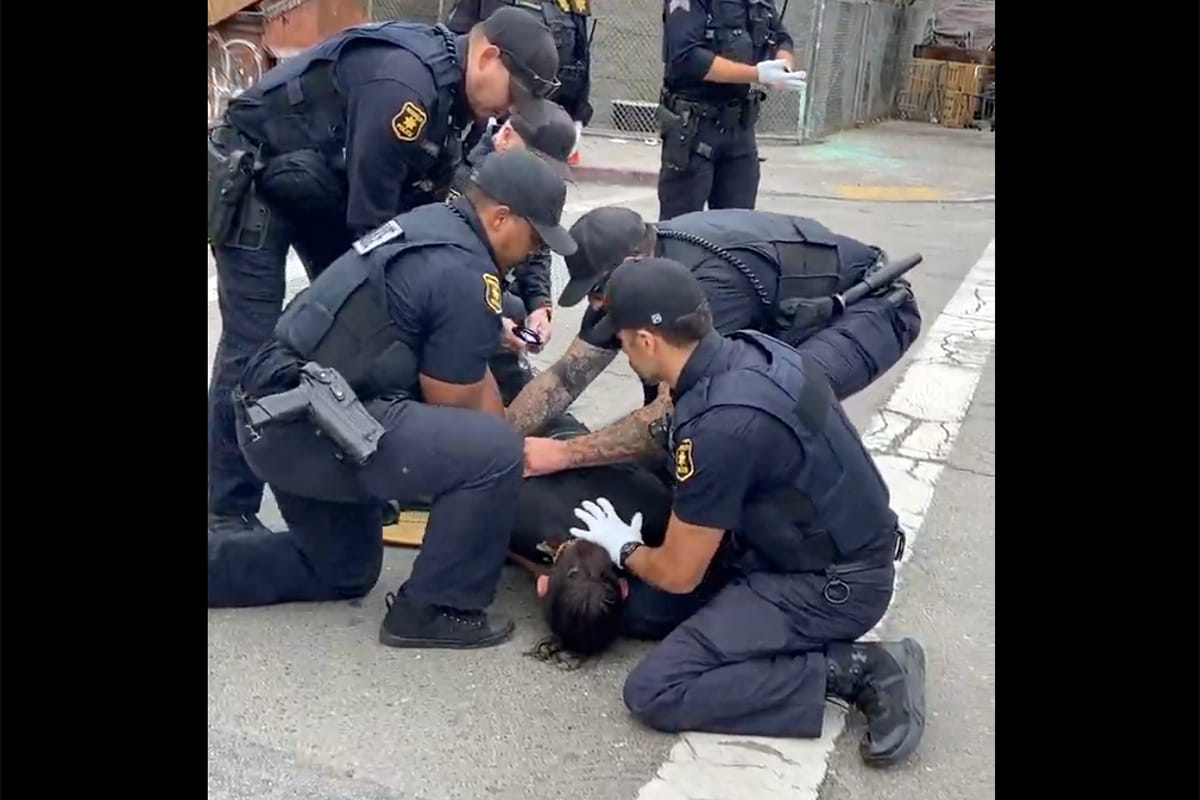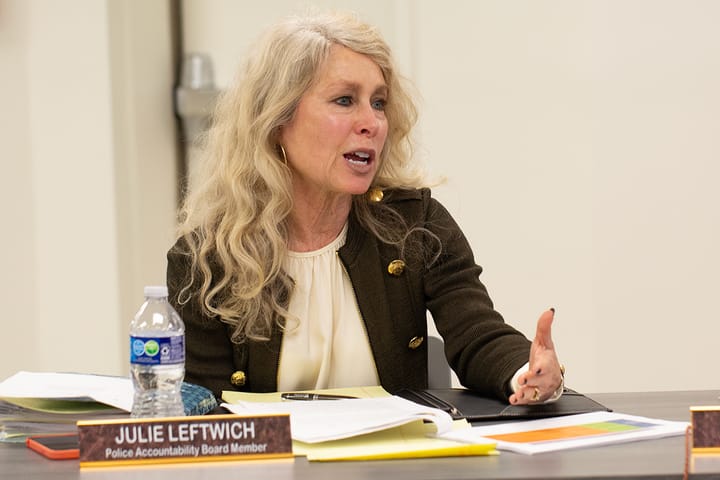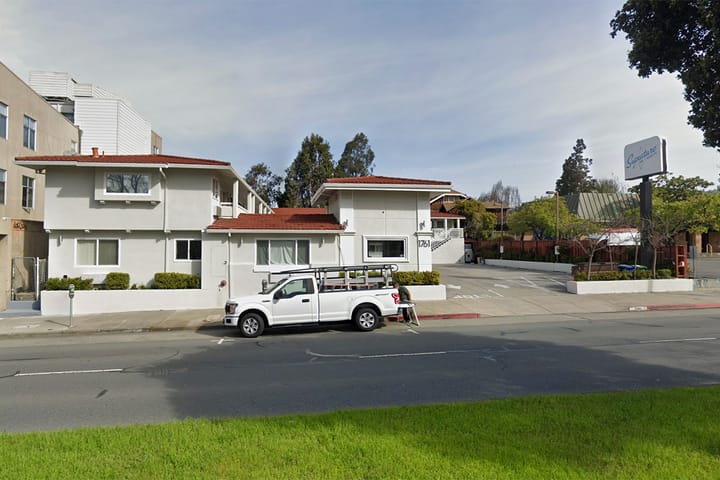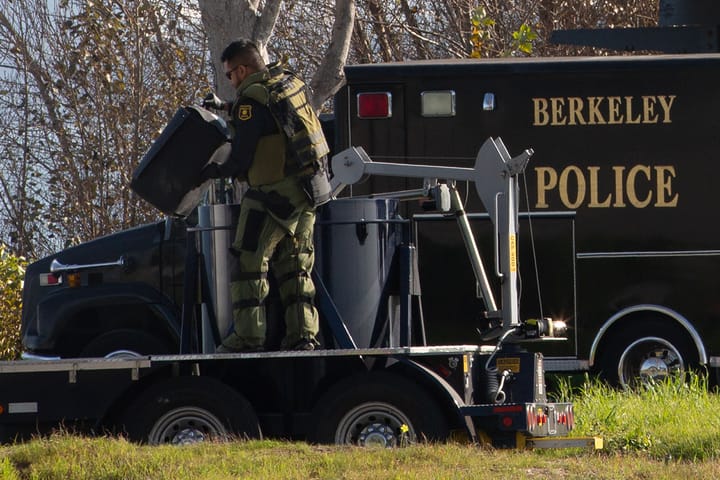Police oversight board to review Berkeley encampment arrest
Video of the June 4 arrest has been circulating online since last week. Berkeley's Police Accountability Board is set to discuss it June 25.

A community group has asked the Police Accountability Board to investigate an arrest during last week's encampment cleanup on Harrison Street — which a federal judge ultimately blocked, citing due process violations.
The group held a rally outside the Police Accountability Board (PAB) meeting Wednesday night, then gave public comment for more than an hour explaining why they thought review was warranted.
In the end, the board agreed to consider the item at a later date because it was not on this week's agenda.
Video of the June 4 arrest has been circulating online since last week.
That's when Berkeley police assisted the city's Homeless Response Team in clearing an encampment in the Harrison Street corridor, the city said this week in a prepared statement.
"When officers arrived, they noted about a dozen individuals in the encampment area that the city would be abating," the city said.
Shortly after 6 a.m., Berkeley police "encountered a known individual who has a prior history of violence-related arrests," the city said.
That individual, 50-year-old Austin White, refused to leave the encampment, according to the city, "and made statements such as, 'I will come out swinging,' and 'Who wants to get maced today?'"
When White did come out of his tent, the city said, "he shoved a metal chain-link fence at officers" and continued refusing to leave.
BPD said White also sprayed a fire extinguisher at officers, "releasing extinguishing powder into the air."
The city said White's pit bulls came out of his tent during the confrontation, "causing officer safety concerns."
One officer used pepper spray to avoid a dog bite and another fired a less-lethal round, "neither of which struck White," the city said.
At that point, officers again told White to leave and said they could help him move if needed, according to the city.
White did leave eventually, without further incident, but returned later and, according to the city, "attempted to re-enter the enclosed area."
A community video shows White arguing with police and then being taken into custody by numerous officers who used their body weight to detain him after he crossed into an area marked off by yellow tape.
Some witnesses said they felt White only moved past the yellow tape because officers were advancing on him.
White — who is no longer in custody, according to booking records — was ultimately charged with felony resisting and possession of methamphetamine as well as misdemeanor battery and resisting arrest, according to court records.
According to the city, White "bit a police officer while being medically cleared at the jail."
He was also arrested on suspicion of several counts of violating his supervised release conditions, police said. He is set to return to court for a pretrial hearing July 21.
White, who has numerous felony cases in Alameda County dating back to 2011, was the only person arrested that morning.
During the operation, firefighters also put out a fire in an oil drum, which filled the air with heavy smoke.
Police did not deploy any smoke or gas during the operation, BPD said.
On Wednesday night, Berkeley Police Chief Jen Louis told PAB that encampment operations are "very challenging and emotional situations."
"They're difficult experiences both for unhoused residents in our community, but also for everyone who's involved," she said. "Recognizing this, there's a lot of work that happens both before and during these efforts."
She said BPD works closely with the city manager's office, the city's Homeless Response Team and the city attorney's office before any encampment operation.
"We take our guidance from the city attorney's office on the noticing that we give, the way the notice is posted, whether it's posted on signs that are in its particular area or written notices," the chief said. "It's not a simple answer, but more complex — depending on the location and what the fact pattern is for that particular area."
The June 4 effort also included Neighborhood Services, Animal Control, Public Works, Health, Housing & Community Services, and staff from the Alameda County CARE program, a diversion program that emphasizes supportive services over jail.
Louis said CARE workers as well as city Mobile Crisis Team members had been staged nearby "to offer immediate mental health assistance to any individuals who need it."
The Homeless Response Team was also at the scene, Louis said, "offering information about services, also assisting residents in gathering and packing their belongings during this closure process."
Louis said there were a dozen campers in the area June 4 and that White was the only one who refused to leave voluntarily.
She said he was medically cleared before being booked and that the department would do a thorough review of all force that was used to detain him.
The June 4 operation provoked strong views on both sides — with many people saying it should have happened sooner, given encampment conditions and associated problems, and others — including federal Judge Edward Chen — saying the city violated due process rights by failing to notify camp residents about the operation in advance.
This week, Judge Chen said the city could break up most of the camp in the future as long as it provides at least a week of notice — but that campers who have pending claims against the city under the Americans with Disabilities Act cannot be removed, for now, pending further discussions and negotiations.
During Wednesday's PAB meeting, longtime homeless rights attorney Osha Neumann said White's arrest was equivalent to the video of the killing of George Floyd.
" It was that level of brutality," Neumann said. "It did not result in death, but it had all the other elements: a person screaming in pain, police surrounding him, sitting on him, continuing to do whatever they did to him that caused that pain."
Another speaker, Elana Auerbach — a longtime activist who ran for the downtown City Council seat last year — called it a "flashpoint situation" where PAB could make a difference by exercising its oversight authority.
" This is cruel. This is punishment. This is not solving anything," she said. "Do a vast investigation to understand who is responsible."
"Everybody who is complicit in this needs to take responsibility and take accountability," Auerbach continued. "The people of Berkeley want to see this. And you all are in a position where you can really blow this up and shine a light on this."
At the end of the public comment period, PAB chairman Joshua Cayetano said he would be creating a Dropbox link where people could share "videos, police reports [and] other pertinent information" about June 4, in part so that PAB could watch key footage publicly in its next meeting.
" We can do our job in this situation — and you have to ask the council to do theirs as well," Cayetano said. "This is obviously very front of mind right now."
Hansel Aguilar, Police Accountability director, said he would also circulate a signup sheet for community members who wanted to share information about the Harrison Street arrest.
He said the item would be on the June 25 PAB agenda and that commissioners could decide then how to proceed.
"We take these matters seriously," Aguilar said. "We want to make sure we do the right thing for the community here. And we are going to go through that process."
PAB Vice-Chair Leah Wilson explained to attendees — many of whom had urged PAB to " do your job" and take action this week — that there was "a limited scope of our authority," including that the board could investigate personnel complaints but not initiate them.
PAB Commissioner Kitty Calavita agreed.
" We depend on the public, if they think there has been wrongdoing, to file an allegation of wrongdoing," she said. "We, the board, are not authorized. This is something, actually, we struggled over. I mean, we attempted to secure that authority, but we're not authorized [under the charter]."
In response to questions from the public, Calavita explained that people could go to the PAB office for help filling out complaint forms.
Wilson said meeting attendees could also meet with staff that night to get copies of the complaint form and ask questions about the process.
PAB has already received one policy review request about the Harrison Street police activity, staff said, as well as a personnel complaint, said Berkeley Copwatch co-founder Andrea Prichett, who attended Wednesday's meeting.
Additional complaints, both personnel and policy-related, are slated to be filed, she said.
(Police personnel complaints are generally not public in California unless they fall under a narrow list of serious police misconduct allegations identified in SB 1421 and SB 16.)
On Friday, community advocate Paul Kealoha-Blake said he had been concerned last week on Harrison Street about a number of issues, from the due process questions raised by Judge Chen to the force used in White's arrest.
He said he was also concerned about the large perimeter officers established that morning, which pushed observers back two blocks.
Kealoha-Blake — who serves on the city's Homeless Services Panel of Experts and has been a mental health commissioner (but spoke Friday in his own capacity) — said having such a large perimeter infringed on the public's right to document and observe what was taking place.
"Two blocks away is too far for me," he said. "And that's not the only time they've done that."
Others have raised similar concerns.
In the end, however, he said his main concern was the lack of mental health support he saw offered to residents who were told to leave the encampment.
"In virtually none of these recent actions is there ever any mental health assistance," he said. "We really need to take care of them. The trauma does them no good at all."




